Learning @ Friends' 24 Plus Program
Cover image and below: Year 7 curriculum group staff, concept mapping for 2024
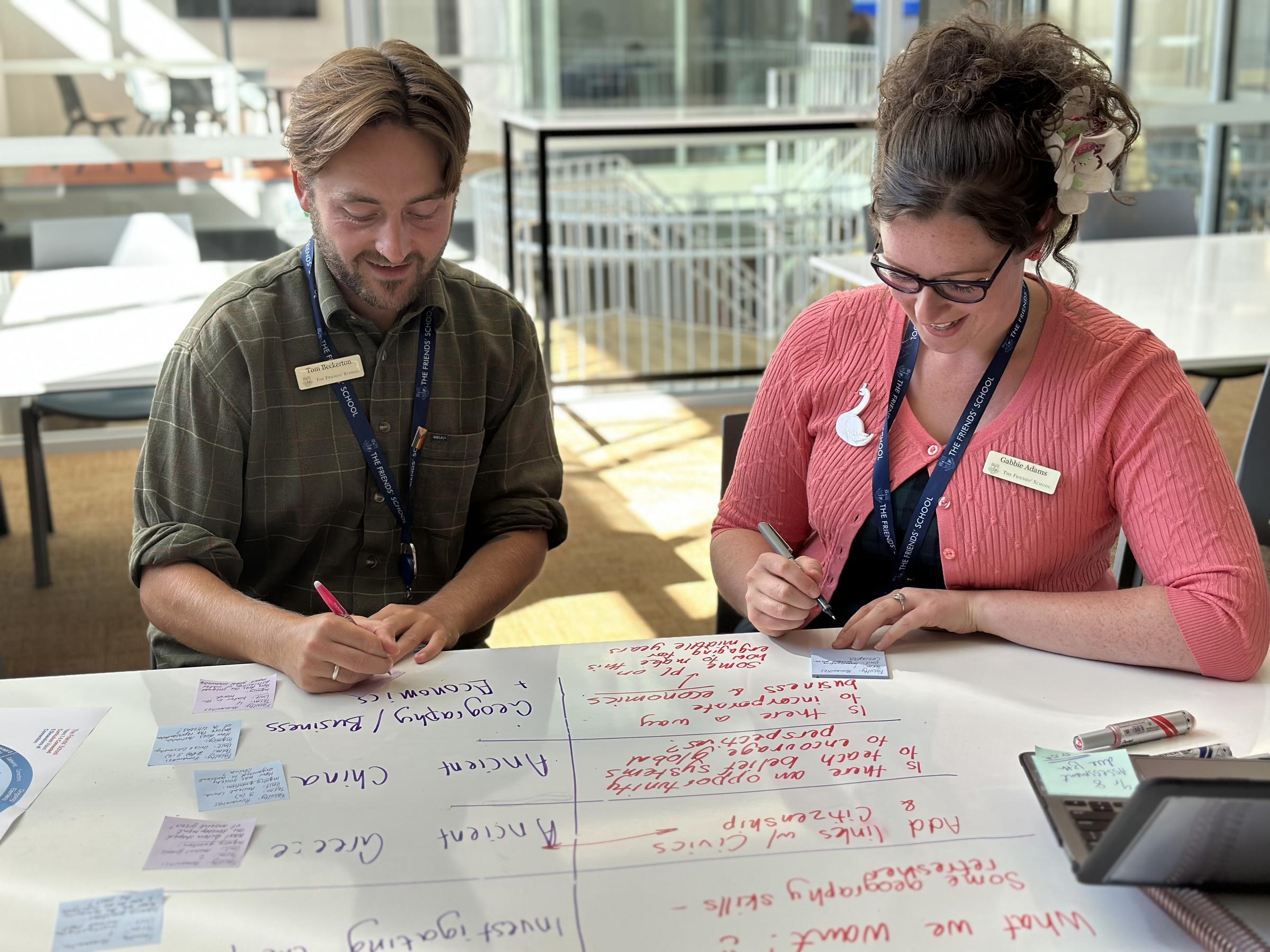
Learning @ Friends' 24 Plus Program
Cover image and below: Year 7 curriculum group staff, concept mapping for 2024
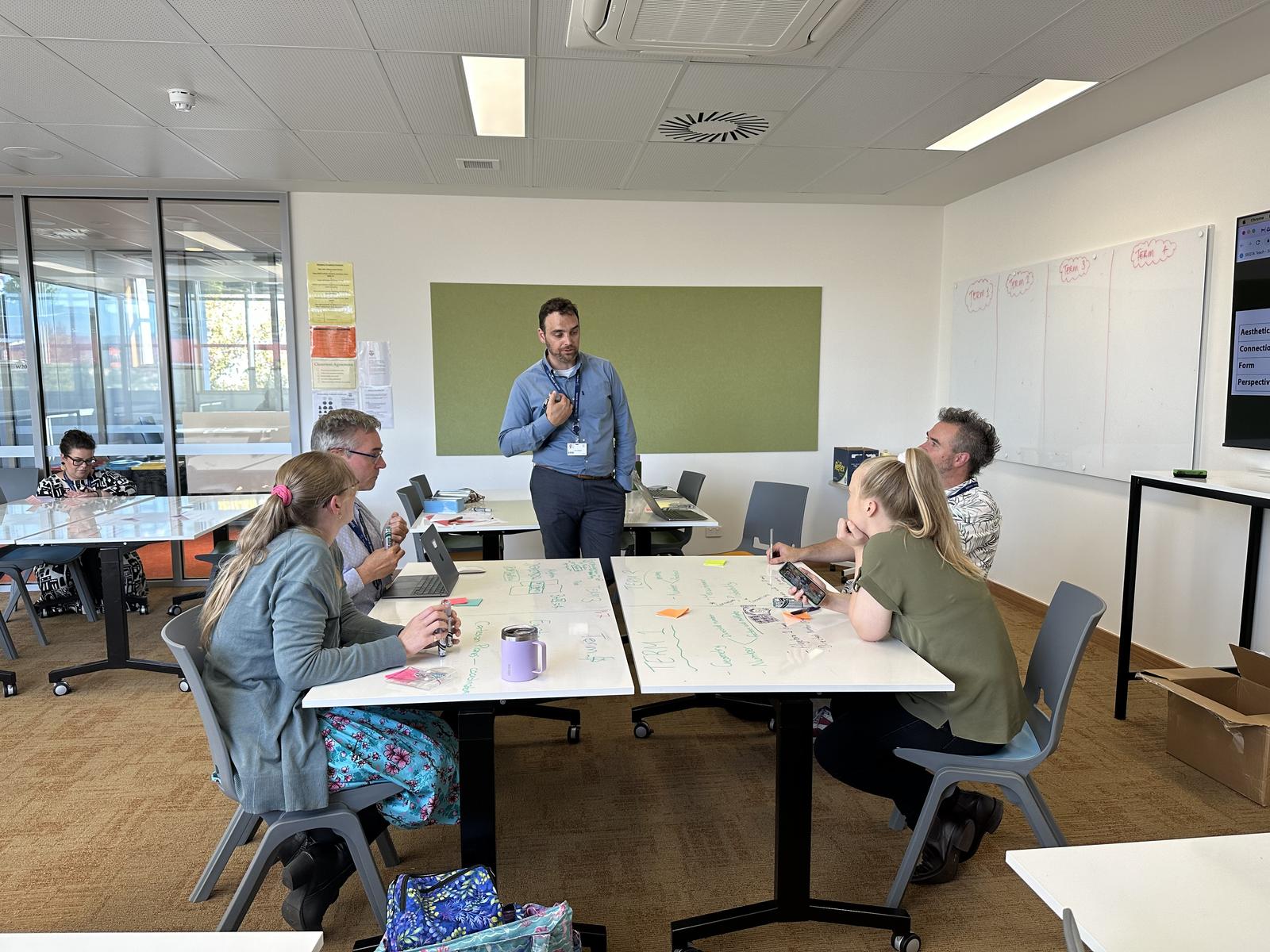
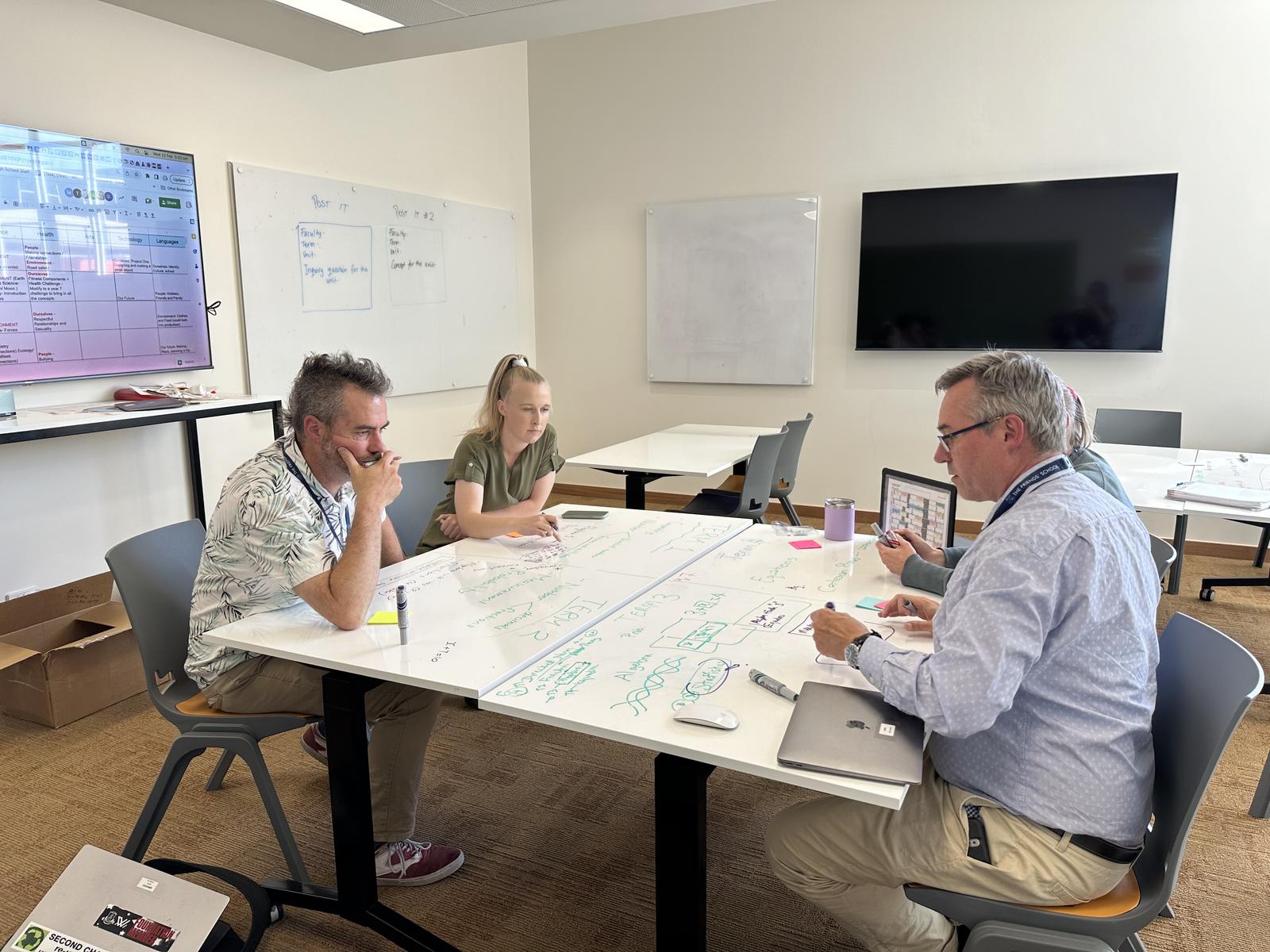
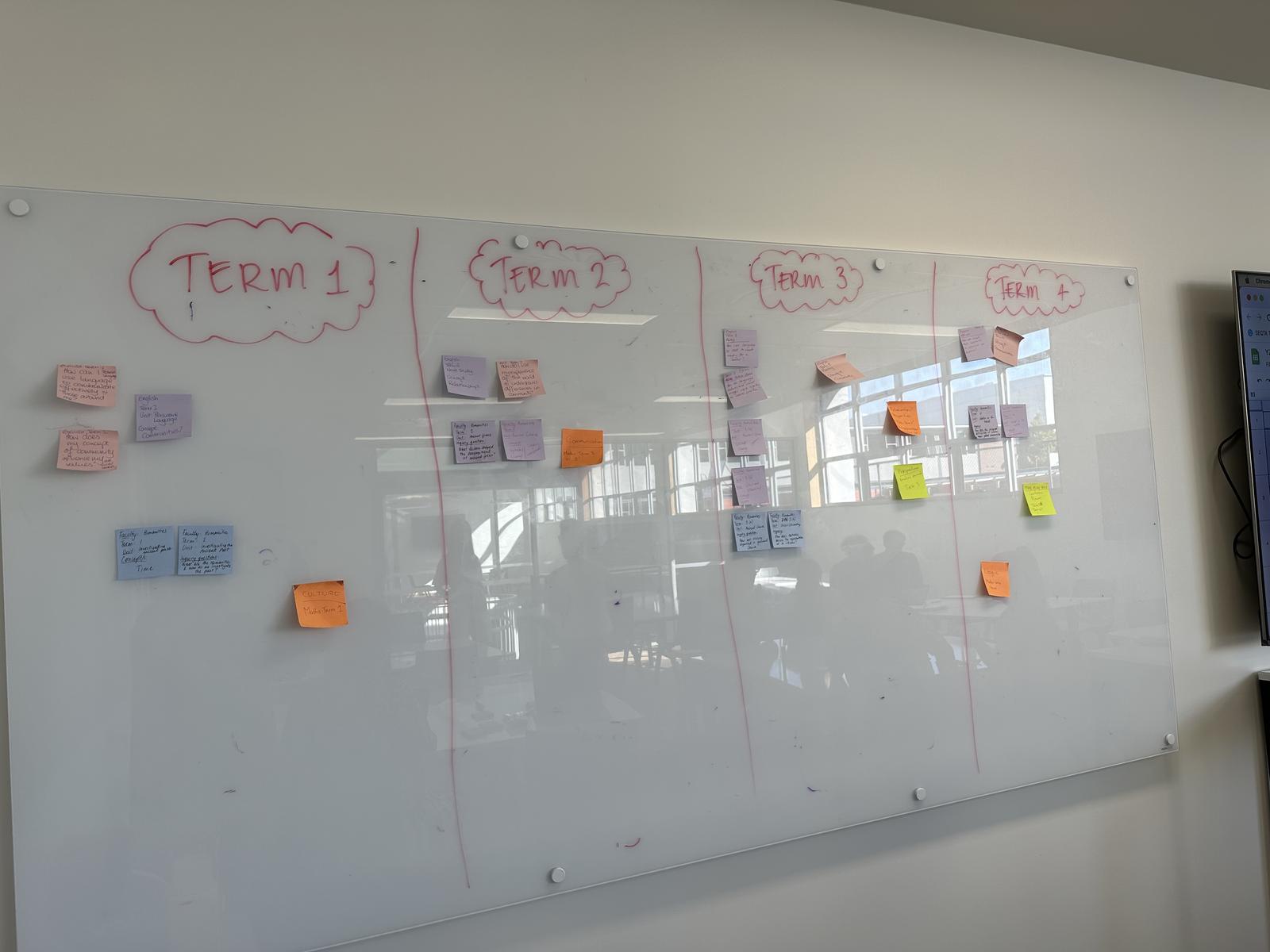



The last 4-5 months of the Learning @ Friends' 24 Plus (L@F24+) Program has seen considerable discussion, design and engagement on the program with various stakeholders.
Below are some key updates for each working group that we would like to share with you:
Staff Leadership
Purpose of the staff leadership reorganisation is to deliver a new leadership structure for Years 7-12 that improves the learning outcomes of our students and enhances staff connection, wellbeing, and provides a clearer structure to support parents/guardians with their children in Years 7-12.
Heads and Deputy Heads appointments for 2024 and beyond include:
Adam Chambers - Head of Years 9 to 12
Lindy Gannon - Head of Years 7 & 8
For information on the above appointments, please click here
John Hoggart – Deputy Head of Campus for Learning Years 7-8
Amy Harris – Deputy Head of Campus for Pastoral Care Years 9-12
Kate Baldry – Deputy Head of Campus for Learning Years 9-12
For information on the above appointments, please click here
We are currently in the process of appointing people to the two final positions - Deputy Head of Years 7 & 8 - Pastoral Care and Deputy Head 9-12 - Year 9.
During March, we consulted on the redeployment of all of our current permanent Heads of Faculty to new roles as Learning Leaders of their subject area Years 9-12. We are very pleased that current Heads of Faculty - Tammy Giblin (Arts), Trish Menadue (PE/Health), Mark Allen (Humanities), Jane Smith (Technology), Nicola Anderson (Science), Karina Churchill (English) and Christine Wittlinger (Languages) - will be redeployed to these revised roles from 1 January 2024. Next year, these roles will no longer report to the Director of Teaching and Learning, but instead to the Head of Campus. We will be advertising the Learning Leader Maths in the first part of Term 2.
Throughout Term 2, we will also be outlining and recruiting for the Heads of House roles.
Years 9 to 12 Curriculum and Timetable
Our Years 9-12 Curriculum is guided by and seeks to uphold The Friends’ School Purpose and Concerns. The Curriculum also seeks to support the realisation of our E-12 Learning Principles by providing the conditions in which ‘students learn best’, with particular emphasis on those most effective in senior years education.
As part of reviewing and determining an updated Years 9-12 Curriculum and Timetable, the relevant working groups have considered:
With the above in mind, the intention for the Years 9-12 Curriculum is to be designed as a spiraling four-year program with the same core structure in each year level, with a simple model in mind. A recommendation for the new model and framework will be shared with our community shortly.
Year 7 & 8 Curriculum and Timetable
Our Years 7-8 Curriculum is guided by and seeks to uphold The Friends’ School Purpose and Concerns. The Curriculum also seeks to support the realisation of our E-12 Learning Principles by providing the conditions in which ‘students learn best’, with particular emphasis on those most effective in middle years education.
As part of reviewing and determining an updated Years 7 & 8 Curriculum and Timetable, the relevant working groups have considered:
The working groups have determined that the Years 7-8 Curriculum framework must implement the following key parameters and elements:
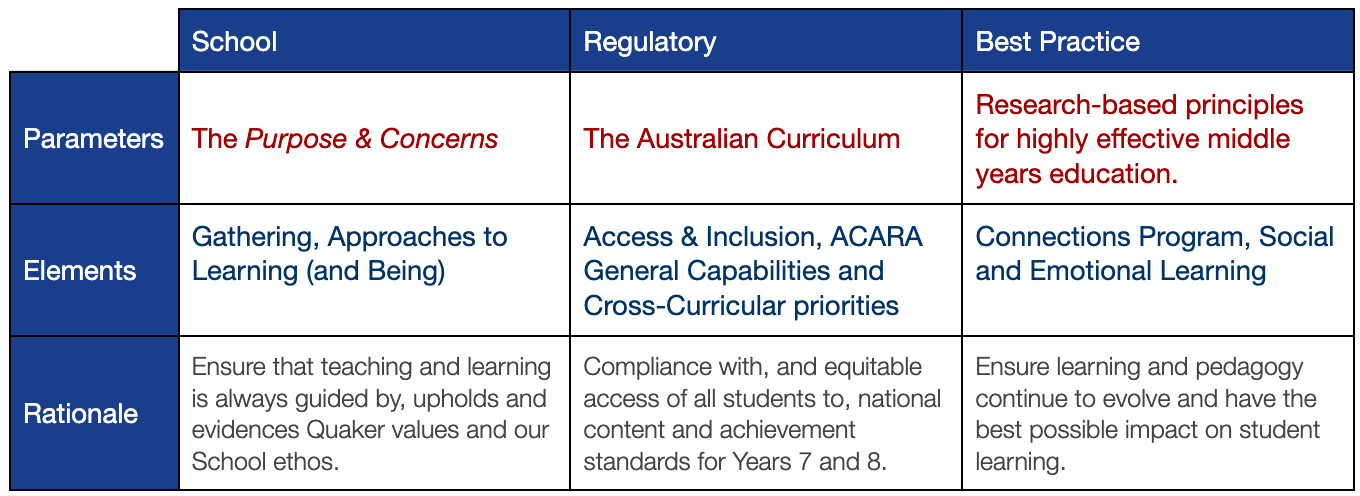

With the above in mind and from extensive research, the new curriculum will include:
A recommendation for the new model and framework will be shared with our community shortly.
Facilities Working Group / Space Utilisation
The Facilities Working Group has overseen the completion of the Science N205 project upgrades and will be working with a new Space Utilisation Working Group on physical facility enhancements and adjustments to support the new structure from 2024.
The 2024 Campus Heads and Deputy Heads are the key members of the Space Utilisation Working Group who are currently planning physical layouts and logistics.
We expect that once we commence the new structure, there will be considerable learnings to inform longer-term and more significant campus enhancements.
House System
To propose a system that best suits the promotion of a House Structure across the entire school. Examining factors that will include E - 8 and 9 -12 campuses, effective student leadership models and the fact that we currently possess two different housing structures across the School
The House System working group has:
The recommendation from this group includes:
The benefits of this recommendation include:
Student Leadership
To deliver a new student leadership model that best supports our Purpose and Concerns and will provide our students with significant leadership opportunities across the new campus structures of E - 8 on Argyle Street and 9 - 12 on Commercial Road
This working group has:
A key theme that has arisen if for more student leadership opportunities to be offered across the school in both formal and informal ways.
A recommendation for the new model and framework will be shared with our community shortly.
Communication
During Term 1, a program survey was circulated for feedback from students, staff and parents/guardians. The results from the staff survey have been shared with staff members which included a large majority indicating that they are either 'Very Excited', 'Enthuastic' or 'Neutral' about the Program. It was also helpful to see some constructive and positive feedback to reinforce upcoming discussions and progression of the Program. Specific feedback for the House System and Student Leadership has helped inform some recommendations being submitted to the Program team and Principal's Committee.
Recommendations are being developed by the Working Group Convenors and submitted to the L@F24+Program team. If the Program team supports the recommendation, it is in turn submitted to the Principal’s Committee. Shortly we will share the recommendations from the House System, Year 7/8 Curriculum, Years 9 to 12 Curriculum, Timetable structure and Student Leadership.
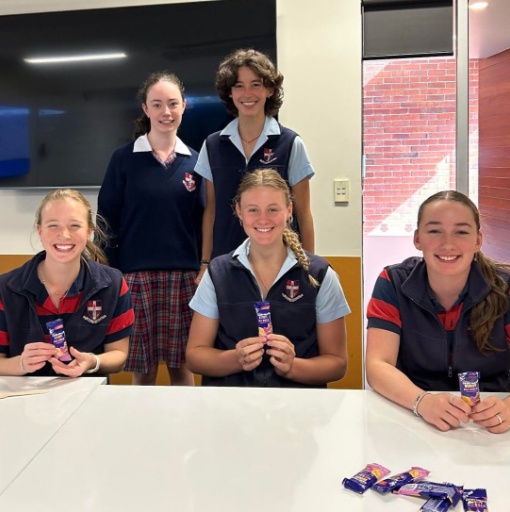

A collection of Year 11 students have been meeting at lunchtimes during Term 1, to plan for next year's campus reorganisation. This has been an exciting opportunity for students to help shape the future direction of the school and is just one example of how we are giving students agency and a voice in what they want the School to look like next year and in the future.
The L@F24+ webpage also includes a google enquiry form for anyone to ask questions or provide feedback. We encourage you to ask questions and provide feedback via this form. If you have any queries in the meantime, please do not hesitate to contact the Program Leader Shaun O’Rourke, Program Coordinator Lyn Tunbridge or Director of Community Engagement, Bill Avery.